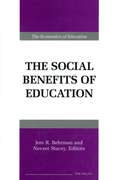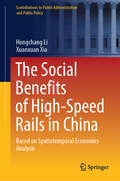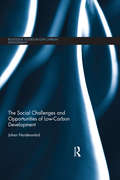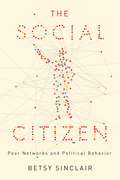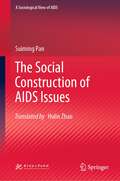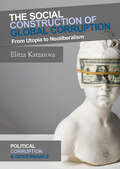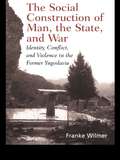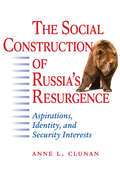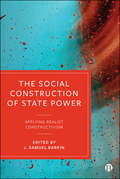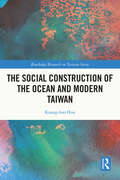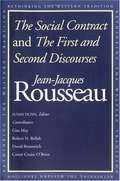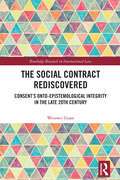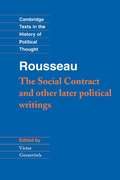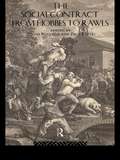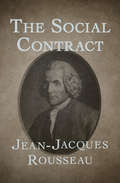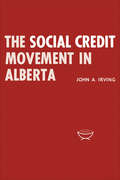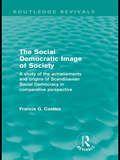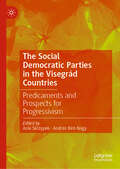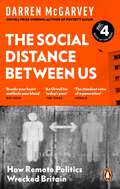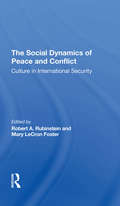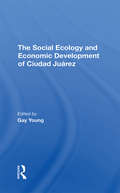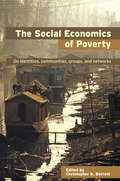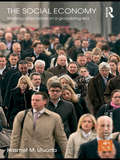- Table View
- List View
The Social Benefits of Education
by Jere R. Behrman Nevzer StaceyFor decades, the primary argument in justifying education has been based on its direct economic effects. Yet education also provides "social benefits" for individuals and society at large, including a better way of taking care of ourselves, and consequently creating a better society to live in. Though it is difficult to quantify these social benefits, a more systematic analysis would improve our understanding of the full effects of education and provide a basis for considering related policies. The Office of Research of the United States Department of Education commissioned a series of papers on measuring these effects of education. Those papers, revised and updated, are collected here. Kenneth J. Arrow provides perspective on education and preference formation, and Jere R. Behrman considers general conceptual and measurement issues in assessing the social benefits of education and policies related to education. These issues are taken up by experts in four fields--health, parenting, the environment, and crime. Themes addressed include measurement issues regarding what we mean by education and its benefits; basic analytical issues in assessing the impact of education on these social benefits using behavioral data; and whether the social benefits of education justify public policy interventions. Jere R. Behrman is William R. Kenan Jr. Professor of Economics, University of Pennsylvania. Nevzer G. Stacey is Senior Research Analyst, Office of Educational Research, U. S. Department of Education.
The Social Benefits of High-Speed Rails in China: Based on Spatiotemporal Economics Analysis (Contributions to Public Administration and Public Policy)
by Hongchang Li Xuanxuan XiaThis book summarizes the quantitative research methods related to the social benefits of high-speed rails. It also explores the political, economic, technological, social and environmental impacts of high-speed rails. As China's new national business card, high-speed railways not only reflect the advanced technology of Chinese railways but also reflect China's increasing comprehensive national power. The highlight of the book is to conduct multidimensional analysis of the social benefits of the high-speed rail with a focus of spatiotemporal economics analysis.
The Social Challenges and Opportunities of Low Carbon Development (Routledge Studies in Low Carbon Development)
by Johan NordensvärdThis book explores the social implications and challenges of low-carbon development. The argument of the book is that a broad understanding of low-carbon development is essential for mitigating climate change and enabling development in a carbon-constrained world, but there are risks that low-carbon development might come at a price that is both social and economic. These risks need to be carefully assessed and reduced. The main aim of the book is to explore, critically analyse and propose different ways of understanding low-carbon development from a social perspective in both developed and developing countries. The author uses concepts such as low-carbon development, social policy, sustainable development and environmental justice to understand the social implications of low-carbon development projects. The book first elaborates the need to understand the social issues and challenges of low-carbon development in both developed and developing countries. It then discusses five contemporary challenges of low-carbon development: the social consequences of Chinese hydropower dams in the Mekong region; the cost of the transition to renewable energies such as wind energy in Germany; the challenges of carbon offsetting in Brazil; the nexus of fuel-inefficient housing and fuel poverty in England; solar power for refugees in Africa. The book fills a crucial gap for researchers, postgraduates, practitioners and policy-makers in the fields of climate change, development and social policy. Johan Nordensvärd is a Lecturer in Social Policy at the University of Southampton, UK.
The Social Citizen: Peer Networks and Political Behavior
by Betsy SinclairHuman beings are social animals. Yet despite vast amounts of research into political decision making, very little attention has been devoted to its social dimensions. In political science, social relationships are generally thought of as mere sources of information, rather than active influences on one's political decisions. Drawing upon data from settings as diverse as South Los Angeles and Chicago's wealthy North Shore, Betsy Sinclair shows that social networks do not merely inform citizen's behavior, they can--and do--have the power to change it. From the decision to donate money to a campaign or vote for a particular candidate to declaring oneself a Democrat or Republican, basic political acts are surprisingly subject to social pressures. When members of a social network express a particular political opinion or belief, Sinclair shows, others notice and conform, particularly if their conformity is likely to be highly visible. We are not just social animals, but social citizens whose political choices are significantly shaped by peer influence. The Social Citizen has important implications for our concept of democratic participation and will force political scientists to revise their notion of voters as socially isolated decision makers.
The Social Construction of AIDS Issues (A Sociological View of AIDS)
by Suiming PanThis book explores AIDS from a relatively macro perspective rather than concrete operational methods and focuses on the social construction of AIDS issues instead of its transmission level in the context of China. First, it begins with the theoretical analysis and the social significance of AIDS, which is different from the simple conflict between different schools of thought. Second, it analyses the contest of various social powers in the process of AIDS construction and conclusion, rather than making different explanations of policies. Last but not least, it elaborates on the central proposition, i.e., the “AIDS issue” is a symbol of China’s social restructuring process. Only in an effort to advance such a process can we be more likely to find the best problem-solving mode, rather than clamouring repeatedly or giving countermeasures alone.
The Social Construction of Global Corruption: From Utopia to Neoliberalism (Political Corruption and Governance)
by Elitza KatzarovaThis book offers new ways of thinking about corruption by examining the two distinct ways in which policy approaches and discourse on corruption developed in the UN and the OECD. One of these approaches extrapolated transnational bribery as the main form of corrupt practices and advocated a limited scope offense, while the other approach tackled the broader structure of the global economic system and advocated curbing the increasing power of multinational corporations. Developing nations, in particular Chile, initiated and contributed much to these early debates, but the US-sponsored issue of transnational bribery came to dominate the international agenda. In the process, the ‘corrupt corporation’ was supplanted by the ‘corrupt politician’, the ‘corrupt public official’ and their international counterpart: the ‘corrupt country’. This book sheds light on these processes and the way in which they reconfigured our understanding of the state as an economic actor and the multinational corporation as a political actor.
The Social Construction of Man, the State and War: Identity, Conflict, and Violence in Former Yugoslavia
by Franke WilmerThe Social Construction of Man, the State, and War is the fist book on conflict in the former Yugoslavia to look seriously at the issue of ethnic identity, rather than treating it as a given, an unquestionable variable. Combining detailed analysis with a close reading of historical narratives, documentary evidence, and first-hand interviews conducted in the former Yugoslavia, Wilmer sheds new light on how ethnic identity is constructed, and what that means for the future of peace and sovereignty throughout the world.
The Social Construction of Russia's Resurgence: Aspirations, Identity, and Security Interests
by Anne L. ClunanShortlisted, 2010 Jospeh Rothschild Prize in Nationalism and Ethnic Studies, Association for the Study of Nationalities.Once again, it appears that Russia is marching to the forefront of the international stage. Anne L. Clunan's analysis of Russia's resurgence convincingly argues that traditional security concerns, historical aspirations, and human agency are coalescing around a new national identity and reconfigured national interests in the post-Soviet nation. Her work moves beyond balance-of-power and realist politics to posit a new, interdisciplinary theory: aspirational constructivism.This groundbreaking theory draws on international relations research and social psychology. Clunan argues that the need for collective self-esteem creates aspirations—often based in a nation's past—that directly shape its national and security interests. In applying this theory to Russia, she points to the nation's continuing efforts to exert influence over former Soviet satellite states and relates the desire for international status found in five broad Russian national self-images—Western, statist, Slavophile, neocommunist, and nationalist—to Russia's definition of its security interests with respect to Europe, Eurasia, and nuclear weapons.Clunan's examination of how sociology, social psychology, and traditional international politics affect post-Soviet Russian identity and security concerns is truly cross-disciplinary. A concluding chapter discusses the policy implications of aspirational constructivism for Russia and other nations and a methodological appendix lays out a framework for testing the theory.
The Social Construction of State Power: Applying Realist Constructivism
by J. Samuel BarkinRealism and constructivism are often viewed as competing paradigms for understanding international relations, though scholars are increasingly arguing that the two are compatible. Edited by one of the leading proponents of realist constructivism, this volume shows what realist constructivism looks like in practice by innovatively combining exposition and critiques of the realist constructivist approach with a series of international case studies. Each chapter addresses a key empirical question in international relations and provides important guidance for how to combine both approaches effectively in research. Addressing future directions and possibilities for realist constructivism in international relations, this book makes a significant contribution to the theorizing of global politics.
The Social Construction of the Ocean and Modern Taiwan (Routledge Research on Taiwan Series)
by Kuang-hao HouThis book interprets the meanings of the uses, regulations, and representations of the ocean undertaken by the state and other societal power sources in modern Taiwan between 1949 and 2016. Following Michael Mann’s historical sociology and Philip Steinberg’s political geography, the book analyses the construction of the ocean by the society of Taiwan in terms of ideological, political, military and economic sources of power. It also provides a structural foundation for creating a framework of the politics in maritime and ocean affairs through the lens of an interpretive analysis of the modern Taiwanese construction of the ocean. Moreover, it explores the social constructions of the ocean through the written works of intellectuals in natural sciences, social studies and humanities in Taiwan after the 1980s. Succinctly revealing how Taiwanese society has influenced the social construction of the ocean, this book will appeal to scholars and students interested in Taiwanese politics and history, political geography and Asian politics.
The Social Contract
by Jean-Jacques Rousseau Maurice CranstonWith the publication of The Social Contract in 1761, Jean-Jacques Rousseau took his place among the leading political philosophers of the Enlightenment. Like his contractarian predecessors (Thomas Hobbes and John Locke), Rousseau sought to ground his political theory in an understanding of human nature, which he believed to be basically good but corrupted by the conflicting interests within society. Here self-interest degenerated into a state of war from which humanity could only be extricated by the imposition of a contract. As a party to the compact, each individual would find his true interest served within the political expression of the community of man, or the "general will."
The Social Contract And The First And Second Discourses
by Susan Dunn Robert N. Bellah Jean-Jacques Rousseau Conor Cruise O'Brien David Bromwich Gita MayJean-Jacques Rousseau's ideas about society, culture, and government are pivotal in the history of political thought. His works are as controversial as they are relevant today. This volume brings together three of Rousseau's most important political writings--The Social Contract and The First Discourse (Discourse on the Sciences and Arts) and The Second Discourse (Discourse on the Origin and Foundations of Inequality)--and presents essays by major scholars that shed light on the dimensions and implications of these texts. Susan Dunn's introductory essay underlines the unity of Rousseau's political thought and explains why his ideas influenced Jacobin revolutionaries in France but repelled American revolutionaries across the ocean. Gita May's essay discusses Rousseau as cultural critic. Robert N. Bellah explores Rousseau's attempt to resolve the tension between the individual's desire for freedom and the obligations that society imposes. David Bromwich analyzes Rousseau as a psychologist of the human self. And Conor Cruise O'Brien takes on the "noxious," "deranged" Rousseau, excoriated by Edmund Burke but admired by Robespierre and Thomas Jefferson. Written from different, even opposing perspectives, these lucid essays convey a sense of the vital and contentious debate surrounding Rousseau and his legacy. For this edition Susan Dunn has provided a new translation of the Discourse on the Sciences and Arts and has revised a previously published translation of The Social Contract.
The Social Contract Rediscovered: Consent’s Onto-Epistemological Integrity in the Late 20th Century (Routledge Research in International Law)
by Wenwei GuanThe Social Contract Rediscovered conducts a critical analysis of the historical evolution of legitimacy, tracing its development from natural law to positive law and finally to post-modern critiques. It fills a scholarly gap by addressing the overlooked aspect of the consent process.The book begins with a recap of the historical development of social contract theory. It draws from a broad base of jurisprudential and social theories to think through how social contract’s rise and fall forms an integral part of legitimacy’s modernization process from the Enlightenment-driven Industrial Revolution’s global proliferation to the end of the 20th century. It then integrates discussion of consensus construction at three levels: private contract legitimacy, national development consensus, and global modern exchange mechanism in the late 20th century. Rather than ask how state legitimacy is constructed in social contract theory, the book asks what role an individual plays in the process of consensual legitimacy construction. This individual-oriented perspective calls for a jurisprudential construction of “process legitimacy” and consensual legitimacy’s onto-epistemological integrity.Providing a new perspective on the social contract, this book will interest scholars of private law, international trade, and development law.
The Social Contract and Other Later Political Writings
by Jean-Jacques Rousseau Quentin Skinner Raymond Geuss Victor GourevitchThe work of Jean-Jacques Rousseau is presented in two volumes, together forming the most comprehensive anthology of Rousseau's political writings in English. Volume II contains the later writings such as The Social Contract and a selection of Rousseau's letters on important aspects of his thought. The Social Contract has become Rousseau's most famous single work, but on publication was condemned by both the civil and the ecclesiastical authorities in France and Geneva. Rousseau fled and it is during this period that he wrote some of his autobiographical works as well as political essays such as On the Government of Poland. This 1997 volume, like its predecessor, contains a comprehensive introduction, chronology and guide to further reading, and will enable students to obtain a full understanding of the writings of one of the world's greatest thinkers.
The Social Contract from Hobbes to Rawls
by Paul Kelly David BoucherFirst published in 2004. Routledge is an imprint of Taylor & Francis, an informa company.
The Social Contract, Discourse On The Virtue Most Necessary For A Hero, Political Fragments And Geneva Manuscript
by Jean-Jacques Rousseau Christopher Kelly Judith R. Bush Roger D. MastersContains the Social Contract, as well as the first English translation of Rousseau's early Discourse on the Virtue Most Necessary for a Hero, numerous previously untranslated political fragments, and the first draft of the Social Contract (the so-called Geneva Manuscript). By placing Rousseau's famous exposition of "political right" and the "general will" in the context of his preparatory drafts, the editors provide significant insight into the formation of one of the most important and influential works in Western political thought.
The Social Contract: Or, The Principles Of Political Rights (World Classics Ser.)
by Jean-Jacques RousseauThe eighteenth-century philosopher&’s landmark treatise against monarchy that inspired the French and American Revolutions. &“Man is born free, and everywhere he is in chains.&” With these stirring words, Jean-Jacques Rousseau begins The Social Contract—the first shot in a battle of ideas that would set the stage for the American War of Independence and the French Revolution. In the feverish days of the Enlightenment, Rousseau took aim squarely at the all-powerful French monarchy, proclaiming that no despot, no matter how powerful, had the right to terrorize his people. He laid out a plan for a new kind of government—an idea that was radical then, and remains so now. The Social Contract is a landmark document from a fascinating period in world history and an invaluable guide to the foundations of modern democracy. This ebook has been professionally proofread to ensure accuracy and readability on all devices.
The Social Credit Movement in Alberta
by John Irving"On the night of August 22, 1935, as Canadians listened to their radios, they heard, with amazement and incredulity, that the first Social Credit government in the world had been elected that day in the province of Alberta. . . . Before the tabulation of votes was completed, telephone calls from New York and London, headlines in newspapers, spot news in broadcasts, had confirmed the slogan of Social Crediters, 'The Eyes of the World are on Alberta.' The morning after the election a number of people lined up at the city hall in Calgary to collect the first installment of the Social Credit dividend of $25 monthly, which, they confidently believed, would be immediately forthcoming from their new government." This quotation from Professor Irving's book indicates how the apparent suddenness of the Social Credit rise to power and the magnitude of the victory aroused world-wide comment. Why had the doctrines of Social Credit, promoted unsuccessfully in the British Commonwealth and the United States for nearly twenty years, achieved political acceptance in Alberta? Why had the people of Alberta elected to public office persons so little experienced in the economic and political world as William Aberhart and his Social Credit colleagues? Professor Iving answers these questions and analyses systematically and comprehensively the rise of the movement as a phenomenon of mass psychology. His study, based mainly on interviews, supplemented with references to private papers, newspapers, and government sources provides a truly fascinating record.
The Social Democratic Image of Society: A Study of the Achievements and Origins of Scandinavian Social Democracy in Comparative Perspective (Routledge Revivals)
by Francis CastlesThis book, originally published in 1978, constitutes a genuinely comparative study of the world's only truly succesful democratic socialist parties: the Social Democraic Parties of Denmark, Norway and Sweden. The measure of achievement is not merely political success, the fact that in Scandinavia the Social Democrats have become 'natural parties of goverment', for just as importantly, the author shows that a political success grounded on the symbiotic relationship between party and trade union movement has been the foundation for a higher level of welfare state provision and egalitarian striving than in virtually any other advanced Western nations. It is a book for friends and foes of democratic socialism alike; for the former to provide an understanding of the tasks ahead and for the latter to know the enemy better.
The Social Democratic Parties in the Visegrád Countries: Predicaments and Prospects for Progressivism
by Ania Skrzypek András Bíró-NagyThis book provides an in-depth analysis of the social democratic parties in the four member states of the so-called “Visegrád Group”- Czech Republic, Hungary, Poland and Slovakia. The timeline spans the last two decades, which saw the parties in question come to power, govern and collapse. The case studies of all four countries are structured in the same way, offering: explanation of the historical background (including electoral results), analyses of the context, structures, membership and voters; evaluation of the programmes and hypotheses for potential future trajectories. Given the European relevance of the topic, the fifth chapter provides a comparative analysis, with a handful of explanations as to why Visegrád Group countries have proved to be tough partners in European integration processes.
The Social Distance Between Us: How Remote Politics Wrecked Britain
by Darren McGarvey*A RADIO 4 BOOK OF THE WEEK**SHORTLISTED FOR THE RATHBONES FOLIO PRIZE FOR NON-FICTION**LONGLISTED FOR THE RSL ONDAATJE PRIZE*'An Orwell for today's poor' - The Times'The standout, authentic voice of a generation' Herald'McGarvey is a rarity: a working-class writer who has fought to make the middle-class world hear what he has to say' Nick Cohen, GuardianWhy are the rich getting richer while the poor only get poorer? How is it possible that in a wealthy, civilised democracy cruelty and inequality are perpetuated by our own public services? And how come, if all the best people are in all the top jobs, Britain is such an unmitigated bin fire?Join Darren McGarvey on a journey through a divided Britain in search of answers. Here, our latter-day Orwell exposes the true scale of Britain's social ills and reveals why our current political class, those tasked with bringing solutions, are so distanced from our lived experience that they are the last people you'd want fighting your corner.Praise for Darren McGarvey:'Utterly compelling' Ian Rankin, New Statesman'Brilliant' Russell Brand'An absolutely fascinating individual' Owen Jones'Offer[s] an antidote to populist anger that transcends left and right... articulate and emotional' Financial Times
The Social Dynamics Of Peace And Conflict: Culture In International Security
by Mary Lecron Foster Robert A RubinsteinThis volume shows the importance for international security studies for better understanding the social dynamics of peace and conflict. It illustrates the crucial role that culture and symbols play in facilitating peace or fostering conflict and intended for anthropologists widely.
The Social Ecology And Economic Development Of Ciudad Juarez
by Gay Young Robert H Schmidt Oscar J Martinez Kathleen A StaudtAs the issue of immigration between Mexico and the United States becomes more critical, it is increasingly important that we understand the process of development in Mexico's northern border region. This collection of essays offers an empirical analysis of development in Ciudad Juárez, with an emphasis on the social and spatial contexts in which economic relations occur. The analyses are framed by a general discussion of urbanization, migration, and industrialization, considered in light of the history of Mexico's northern frontier. Contributors recount the city's pattern of urban growth in response to the natural environment and the changing national culture and examine current patterns of land use, especially as compared to similar development in other Latin American cities. Other issues considered are the impact on household activities of the structure of women's participation in the maquiladora work force; the city's use of its human resources, especially in off-shore assembly activities; and the foreign orientation of the Juárez economy.
The Social Economics of Poverty: On Identities, Communities, Groups And Networks (Priorities for Development Economics)
by Christopher B. BarrettA unique analysis of the moral and social dimensions of microeconomic behaviour in developing countries, this book calls into question standard notions of rationality and many of the assumptions of neo-classical economics, and shows how these are inappropriate in communities with widespread disparity in incomes. This book will prove to be essential for students studying development economics.
The Social Economy: Working Alternatives in a Globalizing Era (Rethinking Globalizations #Vol. 17)
by Hasmet M. UluortaCritically examining economic developments within the last sixty years, this book argues that a crisis in global social reproduction is altering existing understandings of work, labour and the economy. The author of this original volume, Hasmet M. Uluorta, contends that the crisis in the global economy is triggering a potential paradigm shift from one defined under the rubric of Employment to an alternative theorized as Work. Discussing the Employment paradigm that formed the dominant mode of development after the Second World War through to the 1970s, the author considers the economic and political forces that resulted in its eventual decline. Focusing on already existing practices of organizations and workers in Toronto, Canada, the book goes on to consider the shift to Work and the consequent rise in the social economy which has broken down conventional categories of work and leisure. The author concludes that the social economy presents fundamental challenges to understandings that underpinned the previous economic order. Building on insights from a range of disciplines, The Social Economy will be of interest to students and scholars of international political economy, international relations, labour studies, sociology, and globalization studies.
